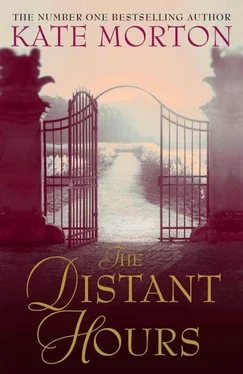A Memory Clarifies
Writing it down now, I’m a little disappointed in myself. But everyone’s an expert with the virtue of hindsight and it’s easy to wonder why I didn’t go looking, now that I know what there was to find. And I’m not a complete dolt. Mum and I met for tea a few days later and, although I failed again to mention my changed circumstances, I did ask her about the contents of the letter. She waved the question away and said it wasn’t important, little more than a greeting; that her reaction had been brought on by surprise and nothing more. I didn’t know then that my mum is a good liar or I might have had reason to doubt her, to question further or to take special notice of her body language. You don’t though, do you? Your instinct is usually to believe what people tell you, particularly people you know well, family, those you trust; at least mine is. Or was.
And so I forgot for a time about Milderhurst Castle and Mum’s evacuation and even the odd fact that I’d never heard her speak of it before. It was easy enough to explain away; most things are if you try hard enough: Mum and I got on all right, but we’d never been especially close, and we certainly didn’t go in for long chummy discussions about the past. Or the present, for that matter. By all accounts her evacuation had been a pleasant but forgettable experience; there was no reason she should’ve shared it with me. Lord knows, there was enough I didn’t tell her.
Harder to rationalize was the strong, strange sense that had come upon me when I witnessed her reaction to the letter, the inexplicable certainty of an important memory I couldn’t pin down. Something I’d seen or heard and since forgotten, fluttering now within the shadowy recesses of my mind, refusing to stop still and let me name it. It fluttered and I wondered, trying very hard to remember whether perhaps another letter had arrived, years before, a letter that had also made her cry. But it was no use; the elusive, granular feeling refused to clarify and I decided it was more than likely my overactive imagination at work, the one my parents had always warned would get me into trouble if I wasn’t careful.
At the time I had more pressing concerns: namely, where I was going to live when the period of prepaid rent on the flat was up. The six months paid in advance had been Jamie’s parting gift, an apology of sorts, compensation for his regrettable behaviour, but it would end in June. I’d been combing the papers and estate agents’ windows for studio flats, but on my modest salary it was proving difficult to find anywhere even remotely close to work.
I’m an editor at Billing & Brown Book Publishers. They’re a small family-run publisher, here in Notting Hill, set up in the late 1940s by Herbert Billing and Michael Brown, as a means, initially, of publishing their own plays and poetry. When they started I believe they were quite respected, but over the decades, as bigger publishers took a greater share of the market and public taste for niche titles declined, we’ve been reduced to printing genres we refer to kindly as ‘speciality’ and those to which we refer less kindly as ‘vanity’. Mr Billing – Herbert – is my boss; he’s also my mentor, champion and closest friend. I don’t have many, not the living, breathing sort at any rate. And I don’t mean that in a sad and lonely way; I’m just not the type of person who accumulates friends or enjoys crowds. I’m good with words, but not the spoken kind; I’ve often thought what a marvellous thing it would be if I could only conduct relationships on paper. And I suppose, in a sense, that’s what I do, for I’ve hundreds of the other sort, the friends contained within bindings, page after glorious page of ink, stories that unfold the same way every time but never lose their joy, that take me by the hand and lead me through doorways into worlds of great terror and rapturous delight. Exciting, worthy, reliable companions – full of wise counsel, some of them – but sadly ill-equipped to offer the use of a spare bedroom for a month or two.
For although I was inexperienced at breaking up – Jamie was my first real boyfriend, the sort with whom I’d envisaged a future – I suspected this was the time to call in favours from friends. Which is why I turned to Sarah. The two of us grew up as neighbours and our house became her second home whenever her four younger siblings turned into wild things and she needed to escape. I was flattered that someone like Sarah thought of my parents’ rather staid suburban home as a refuge, and we remained close through secondary school until Sarah was caught smoking behind the toilets one too many times and traded in maths classes for beauty school. She works freelance now, for magazines and film shoots. Her success is a brilliant thing, but unfortunately it meant that in my hour of need she was away in Hollywood turning actors into zombies, her flat and its spare room sublet to an Austrian architect.
I fretted for a time, envisaging in piquant detail the sort of life I might be forced to eke out sans roof, before, in a fine act of chivalry, Herbert offered me the sofa in his little flat below our office.
‘After all you did for me?’ he said, when I asked if he was sure. ‘Picked me up off the floor, you did. Rescued me!’
He was exaggerating; I’d never actually found him on the floor, but I knew what he meant. I’d only been with them a couple of years and had just started to look around for something slightly more challenging when Mr Brown passed away. Herbert took the death of his partner so hard, though, that there was no way I could leave him, not then. He didn’t appear to have anyone else, other than his rotund, piggy little dog, and although he never said as much, it became clear to me by the type and the intensity of his grief that he and Mr Brown had been more than business partners. He stopped eating, stopped washing, and drank himself silly on gin one morning even though he’s a teetotaller.
There didn’t seem to be much choice about the matter: I began making him meals, confiscated the gin, and when the figures were very bad and I couldn’t raise his interest, I took it upon myself to door-knock and find us some new work. That’s when we moved into printing flyers for local businesses. Herbert was so grateful when he found out that he quite overestimated my motivation. He started referring to me as his protégée and cheered up considerably when he talked about the future of Billing & Brown; how he and I were going to rebuild the company in honour of Mr Brown. The glimmer was back in his eyes and I put off my job search a little longer.
And here I am now. Eight years later. Much to Sarah’s bemusement. It’s hard to explain to someone like her, a creative, clever person who refuses to do anything on terms that aren’t her own, that the rest of us have different criteria for satisfaction in life. I work with people I adore, I earn enough money to support myself (though not perhaps in a two-bedder in Notting Hill), I get to spend my days playing with words and sentences, helping people to express their ideas and fulfil their dreams of publication. Besides, it’s not as if I haven’t got prospects. Just last year, Herbert promoted me to the position of Vice Chairman; never mind that there are only the two of us working in the office full-time. We had a little ceremony and everything. Susan, the part-time junior, baked a pound cake and came in on her day off so we could all three drink non-alcoholic wine together from teacups.
Faced with imminent eviction, I gratefully accepted his offer of a place to stay; it was really a very touching gesture, particularly in light of his flat’s tiny proportions. It was also my only option. Herbert was extremely pleased. ‘Marvellous! Jess will be beside herself – she does love guests.’
Читать дальше












